A week into not being a member of the EU, we’re starting to see who has been thinking about what happens.
One of the key messages of Article 50 was that being an agenda-setter was a deeply consequential thing, both on the procedural mechanics and the framing of substantive issues.

Then, as now, the EU has demonstrated much the stronger position on achieving this.
On Monday we had the publication of the draft mandate, which offers a legal basis (an Association Agreement under Art.217 TFEU), with attendant structure and cross-linkage of the various elements. As much as it claimed to be adaptable to changing British positions, the document was presented with very firm language about what was and wasn’t going to be acceptable.
The contrast with the UK’s effort – a rather telegraphic ministerial notice – might well be in keeping with a government that it relearning how to negotiate trade, but equally it highlights the comparative thinness of the position.
It also demonstrates the harsh realities of international trade: the bigger partner gets to decide much of what happens, because they matter more. The UK is likely to see the same every time it interacts with a larger counterpart, just as it’ll be able to throw itself around a bit more with the small fry.
So far, so predictable. But there’s another agenda-setting race that is going on.
The UK domestic political debate remains that is alive and contested and here those sympathetic to Number 10’s worldview appear to be holding the upper-hand.
While there has been a re-ordering among groups – including this week’s news that Open Europe will be rolled into Policy Exchange – that appears minor in comparison to the space left after the impulsion of the People’s Vote campaign, which might have logically provided the framework for pursuing softer options.
Remainers not only lost the withdrawal argument, but appear to have failed badly in preparing for this moment. Labour’s leadership race has taken them out of the equation for months, even as the LibDems have gone very quiet after the hubris of last autumn. And even if they do get their act together, without their old allies on the Tory backbench they lack any weight in Parliamentary procedures.
As I’ve noted before, the contrast with eurosceptics in the 1990s is instructive. In that case, there was a resilience and a determination to pursue their case despite set-back after set-back. Pro-Europeans do not yet seem to have the same durability.
Of course, the logical extension of this is that things are never settled. Just because the hard-Brexit narrative looks dominant right now in the UK, it does not mean that other world-views cannot come back.
Just that it will be more difficult.
